
- Subject:
- Applied Science
- Business and Communication
- Communication
- Engineering
- Material Type:
- Syllabus
- Provider:
- CUNY Academic Works
- Provider Set:
- City College
- Author:
- Sun, Yi
- Date Added:
- 09/20/2019

OER created at CUNY for courses in Business and Communications fields.
Image by Gordon Johnson from Pixabay


This rubric was designed to assess presentation skills for student in the BS in Business at CUNY College of Staten Island.

This 7-week lesson plan is designed for use in clinical nursing courses. It is designed specifically for use by Nursing faculty teaching in the absence of state required patient facing clinical opportunity due to COVID restrictions. The lesson plan describes pedagogical techniques and provides video and education OER resources designed to help support the development of empathetic communication skills over 7 weeks. Refection and video debriefing techniques will be employed. Role play will culminate in the group presentation project of a brief video modeling effective therapeutic empathetic communication.

The objective of the course is to examine current practices in the apparel industry in the areas listed below, divided into three modules of instruction. The course culminates in a final module during which students will develop their original ideas based on research in these areas:
Module 1: Fair Trade and Ethics Global practices in the industry
Module 2: Sustainability and Sustainable Alternatives Biosynthetic materials being developed in conjunction with efforts to thwart climate change
Module 3: Technology in Fashion Smart textiles that redefine functionality of garments
Module 4: Design, Market and Pitch a product or collection grounded in one of these emerging areas of the fashion industry
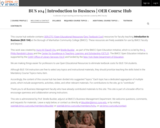
This course hub website contains OER/ZTC (Open Educational Resources/Zero Textbook Cost) resources for faculty teaching Introduction to Business (BUS 104) at the Borough of Manhattan Community College (BMCC). These resources are freely available for use by BMCC faculty and beyond.
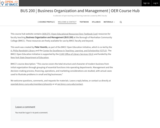
This course hub website contains OER/ZTC (Open Educational Resources/Zero Textbook Cost) resources for faculty teaching Business Organization and Management (BUS 200) at the Borough of Manhattan Community College (BMCC). These resources are freely available for use by BMCC faculty and beyond.

BUSN 3100 Principles of Marketing
An overall view of the field of marketing and the theory of consumer and enterprise demand. Emphasis is given to consumer behavior, advertising, social responsibility, marketing strategies, market potential, product planning and development, market research, pricing, sales promotion, channels of distribution and government regulation.
BUSN 3140 Consumer Behavior
An interdisciplinary approach to understanding consumer motivation and behavior. The relationship of information processing and learning theory on buyer behavior, importance and measurement of images and attitudes, theories of promotion and communication, and models of consumer behavior. Consumerism. Application of theoretical principles to advertising, positioning, segmentation, and product strategies.
BUSN 3200 Principles of Management
This course explores the functions of the manager and the organization and operation of American business. Also we cover management processes, concepts, and specific problems of production, management, labor relations, marketing, financing, decision making and accounting.
BUSN 4100 Seminar in Marketing Research
This course focuses on techniques of marketing research, including research design, use of primary and secondary data, questionnaire construction, sample selection, data collection and analysis, report writing, and applications of research to the solution of marketing problems.
BUSN 4101 Seminar in Strategic Marketing
Equips students with marketing decision making skills through case study analysis and demonstrates how to develop a strategic marketing plan. Emphasis on the integration of marketing research, market segmentation, targeting, and positioning; and product, pricing, distribution, and promotion strategies. Importance of marketing ethics and corporate social responsibility in decision making. This course is writing-intensive.
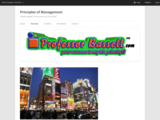
An overall view of the field of marketing and the theory of consumer and enterprise demand. Emphasis is given to consumer behavior, advertising, social responsibility, marketing strategies, market potential, product planning and development, market research, pricing, sales promotion, channels of distribution and government regulation. (Not open to students who have completed Economics 3001 [50.2].)
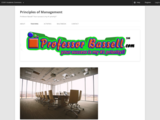
Study in managerial decision making to solve a wide range of operating management problems. Topics covered include: planning, evaluating, and control of operations; forecasting and inventory management; scheduling; project design and management; resource allocation; queuing models; quality of the work environment; and technological change. Design and implementation of management strategy will be emphasized through computer simulation, problems, and cases.
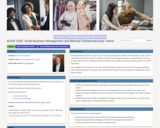
Entrepreneurship has become a major source of economic growth and job creation in the United States. As the number of small businesses increases in the U.S. economy, so does the need to prepare students in entrepreneurship. This course provides students with the knowledge and skills to effectively start, operate, and develop a business venture or non-profit organization.
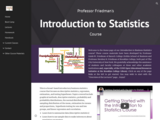
This open education resource (OER) contains course materials for a full semester course in Statistics. These course materials were developed by Professors Linda Weiser Friedman (Baruch College, CUNY) and Hershey H. Friedman (Brooklyn College, CUNY).
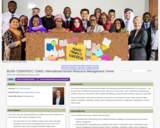
This course is based upon the belief that the quality of the educational environment depends both on “me and you.” I will put extra effort to facilitate the learning process and I expect you to do the same. Such a belief will be implemented by creating a classroom environment in which students will challenge concepts and ideas positively, openly, and respectfully.
The course examines human resource decisions and practices in an international context. Topics include recruiting, selection, expatriation, repatriation, training, career management, performance management, compensation, and cross-cultural issues.
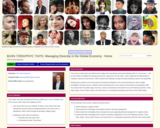
This course is based upon the belief that the quality of the educational environment depends both on “me and you.” I will put extra effort to facilitate the learning process and I expect you to do the same. Such a belief will be implemented by creating a classroom environment in which students will challenge concepts and ideas positively, openly, and respectfully.
Drawing upon research in the social science and business disciplines, this course will provide you with an-depth knowledge of diversity issues in a global context and develop your cross-cultural communication and negotiation skills. You will also learn the politico-legal, economic, cultural, and business environments of one the following countries: China, India, Japan, France, Brazil, Russia, and South Africa in a comparative perspective with those of the United States.
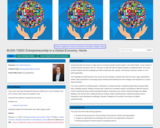
Entrepreneurship has become a major source of economic growth and job creation in the United States. As the number of small businesses increases in the U.S. economy, so does the need to prepare students in entrepreneurship. This course provides students with the knowledge and skills to effectively start, operate, and develop a business venture or a non-profit organization.

This video lecture presents the basic definitions of assets, liabilities and equity with simple examples. It also explains the concept of accounting equation with examples.

This lecture is about bonds. A bond is a debt investment in which an investor loans money to an entity (typically corporate or governmental) which borrows the funds for a defined period of time at a variable or fixed interest rate. It discusses the bond terminology, how to compute the price and yield of the different types of bonds. Additionally, it describes why bond prices change over time and how credit risk affects a corporate bond.

The trifecta of globalization, urbanization and digitization have created new opportunities and challenges across our nation, cities, boroughs and urban centers. Cities are in a unique position at the center of commerce and technology becoming hubs for innovation and practical application of emerging technology. In this rapidly changing 24/7 digitized world, city governments worldwide are leveraging innovation and technology to become more effective, efficient, transparent and to be able to better plan for and anticipate the needs of its citizens, businesses and community organizations. This class will provide the framework for how cities and communities can become smarter and more accessible with technology and more connected.

The trifecta of globalization, urbanization and digitization have created new opportunities and challenges across our nation, cities, boroughs and urban centers. Cities are in a unique position at the center of commerce and technology becoming hubs for innovation and practical application of emerging technology. In this rapidly changing 24/7 digitized world, city governments worldwide are leveraging innovation and technology to become more effective, efficient, transparent and to be able to better plan for and anticipate the needs of its citizens, businesses and community organizations. This class will provide the framework for how cities and communities can become smarter and more accessible with technology and more connected.

The trifecta of globalization, urbanization and digitization have created new opportunities and challenges across our nation, cities, boroughs and urban centers. Cities are in a unique position at the center of commerce and technology becoming hubs for innovation and practical application of emerging technology. In this rapidly changing 24/7 digitized world, city governments worldwide are leveraging innovation and technology to become more effective, efficient, transparent and to be able to better plan for and anticipate the needs of its citizens, businesses and community organizations. This class will provide the framework for how cities and communities can become smarter and more accessible with technology and more connected.

The trifecta of globalization, urbanization and digitization have created new opportunities and challenges across our nation, cities, boroughs and urban centers. Cities are in a unique position at the center of commerce and technology becoming hubs for innovation and practical application of emerging technology. In this rapidly changing 24/7 digitized world, city governments worldwide are leveraging innovation and technology to become more effective, efficient, transparent and to be able to better plan for and anticipate the needs of its citizens, businesses and community organizations. This class will provide the framework for how cities and communities can become smarter and more accessible with technology and more connected.